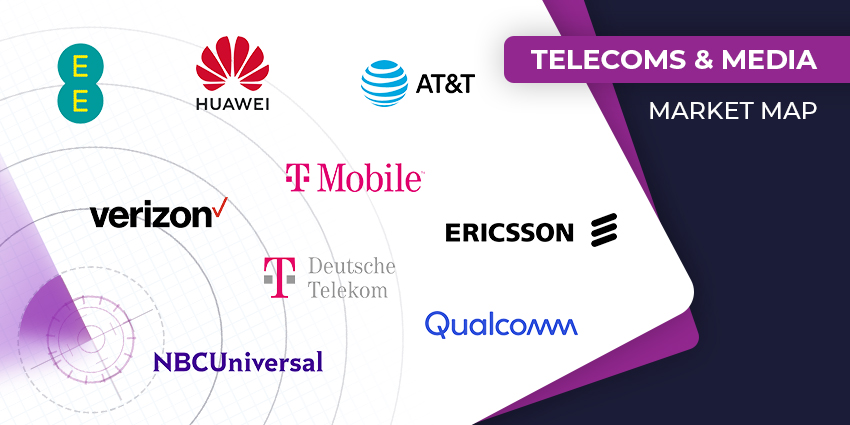Increasingly, innovative media and telecoms companies are investing in artificial intelligence, extended reality, and the metaverse to transform the way we connect. As digital transformation continues rapidly, pioneering brands open the door to new realities for customers and their consumers with immersive solutions.
Offering everything from comprehensive, immersive spaces to integrations with XR software, these vendors are reshaping the future of communication and media distribution.
We created this market map to provide insight into the top media and telecoms brands, introducing new ways for people to communicate, collaborate, and evolve in 2024 and beyond.
The article provides a snapshot of the vendors featured in our Media & Telecoms Marketplace.
- EE
- Huawei
- AT&T
- Ericsson
- T-Mobile
- Verizon
- Qualcomm
- NCBU
- Deutsche Telekom
EE
EE, a well-known media and telecoms company, has invested in a range of ways to transform its product portfolio in recent years. The company’s intuitive 5G connectivity solutions allow organizations to use powerful extended reality and immersive experiences, paving the way to the metaverse. EE has even partnered with vendors like BT on new solutions for sports and performing arts experiences in extended reality.
EE believes in simplifying the path to XR innovation with enhanced connectivity, integrating wearable devices, and creating extended reality applications. EE consumers can even leverage various tools to gain insights into consumer experiences in augmented reality.
Huawei
Like many media and telecoms companies in the modern world, Huawei has increased its focus on extended reality in recent years, thanks to the evolution of 5G connectivity. In recent years, the company has positioned itself at the forefront of developing and deploying immersive technologies and metaverse environments for businesses.
The organization even launched a series of next-generation innovative solutions powered by the AR-HUD. The Huawei team also introduced its 5G MIMO and FTTR solutions for XR data transmissions. Reportedly, the group may also be investing in developing high-end virtual and extended reality headsets.
AT&T
Working with businesses across the globe, AT&T believes extended reality and AI will transform the way we connect in the years ahead. The company partners with organizations to develop tailor-made solutions for enterprise-grade XR. AT&T’s extended reality solutions enable digital transformation with AR, VR, and mixed reality applications delivered as a fully managed service.
AT&T’s technologies support mobile-first voice, video, conferencing, team collaboration, and messaging and offer access to valuable insights and reporting tools. The company also creates cloud and edge solutions to assist companies in delivering data to XR devices with minimal latency and extra security. AT&T offers specialist consulting and professional services to businesses in its partner ecosystem.
Ericsson
One of the media and telecoms leaders investing in the new age of mobile connectivity, Ericsson is experimenting with everything from 5G-powered XR conversations to 6G mobility. The company develops future-ready networks for extended reality experiences and provides organizations with comprehensive ecosystems for application development.
EE’s technologies support a range of immersive use cases, from unlocking the future of entertainment with 5G experiences to bringing AR interactions to consumers. The company is even investing in supporting holographic communication with mobile connections. Ericsson also offers solutions for companies investing in accompanying XR technologies, such as Edge Computing, the Internet of Things, and AI in network connections.
T-Mobile
Invested in powering the next wave of immersive experiences through 5G and robust computing solutions, T-Mobile has developed its own XR Accelerator Program. This program aims to address the growing demand for immersive talent and developers. T-Mobile also collaborates with startups and visionaries to provide resources for developing immersive apps.
The brand is one of the top partners of Qualcomm Technologies and regularly experiments with opportunities to enhance edge computing and cloud rendering technologies. T-Mobile has even helped companies develop 5G-powered labs for healthcare educational purposes. It’s also experimenting with the future of holographic communication.
Verizon
Another media and telecoms company taking advantage of 5G to develop immersive experiences, Verizon works alongside numerous companies to create devices and apps for XR. Verizon sells a variety of immersive wearables through partnerships with extended reality vendors and offers powerful connectivity solutions to evolving brands.
Verizon is also investing in creating new 5G platforms for developers building new interactive experiences. The company offers private 5G connections, secured and managed for business users on its network. Organizations can also take advantage of Verizon’s investments in the IoT space.
Qualcomm
Supporting various top XR developers and telecommunication companies worldwide, Qualcomm develops dedicated chips and hardware for wearables, smartphones, and other devices. The company’s solutions bridge the gap between the virtual and physical worlds with powerful processing capabilities and artificial intelligence.
Qualcomm’s Snapdragon XR platforms empower teams to create immersive worlds with lifelike avatars and unlock boundless scalability with edge cloud processing and 5G. The company is also responsible for the Snapdragon Spaces platform, which promises companies access to a new era of solutions for spatial computing experiences.
NBCU
NBCU or NBCUniversal builds intelligent solutions for shopping (retail), advertising, and media delivery. The company launched a new collection of innovations in 2021 using the global One platform to help businesses take advantage of AR and VR experiences. With NBCU, companies can create comprehensive events, experiences, and customer service tools in the metaverse. The company can also work with teams to create custom content.
NBCU’s global content and commercial innovations include tools like @homeShopping, which transforms digital shopping into an immersive experience with AR interactions. There’s also a “Choose your Destiny” solution for consumers to explore. NBCU’s solutions provide companies with access to a library of pre-built tools and assets to use when entering the XR space.
Deutsche Telekom
Investing heavily in a vast XR developer community through their technology incubator, Hubraum, Deutsch Telekom offers companies a way to simplify building immersive experiences. The brand works alongside innovators to create valuable experiences with augmented and virtual reality, leveraging expertise and cutting-edge technology.
Deutsche Telekom is a consultant and service provider for other companies building use cases for virtual and augmented reality, designed to support customer interactions. The organization also works alongside vendors like Qualcomm to take advantage of XR-ready chips and computing tools within its devices.







